In an analysis of the significant outcomes of the 27th Session of the Conference of the Parties (COP27) to the United Nations Framework Convention on Climate Change (UNFCCC), which ran from November 6 to 18, 2022, in Sharm el-Sheikh, Egypt, the Pan African Climate Justice Alliance (PACJA) emphasised that, despite the adoption of the Loss and Damage Fund, the global summit did not meet the continent’s expectation. Excerpts:

General orientation is that COP27 was not an African people’s COP as thought which stemmed from the thinking that African needs will be given priority. As such, the call for Africa as a special needs and circumstances region has been pushed again which shows concerns of Africa not being seen as a priority.
Doubling of the Adaptation Fund (AF) that was announced in Glasgow did not emerge in the details in COP27. The decisions in the funding for $100 billion alludes to mitigation and should have focused more on adaptation.
The just transition and climate justice nexus needs to be handled with care to overcome the overlap that is emerging. The two issues need to be approached separately since climate justice is a broader issue and should not be subsumed in the just energy transition discourse alone – it needs to cut across all tracks of conversations.
Moving forward, we should build momentum around focusing on mitigation in the global north. The big polluters must be held accountable for their historical actions that are impacting Africa whose emissions is the least. The north must cut on their emissions first since in Africa adaptation is key in building resilient communities and the loss and damage conversation needs to persist.
We conclude that COP27 did not meet the expectations of Africa, even though the Parties discussed the burning issue of financing loss and damage for the first time. In some instances, especially in the language on mitigation and energy, we conclude that COP27 lowered the bar and failed to spur the magnitude of ambition to reduce emissions and support adaptation needed to address the climate crisis squarely. In failing to table Africa’s special needs and circumstances for discussion, debates and decisions missed the critical perspectives necessary to develop global climate policies and actions needed to respond to the urgency of climate change impacts on the continent.
The Africa Group of Negotiators (AGN) played a key role in the negotiations at COP27, and other ministers need to be encouraged to be fully involved in the negotiations so as to have a stronger voice in the negotiation rooms.
